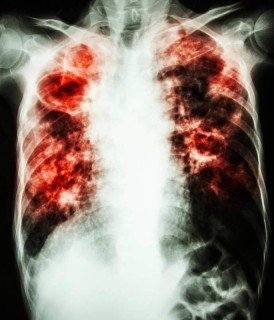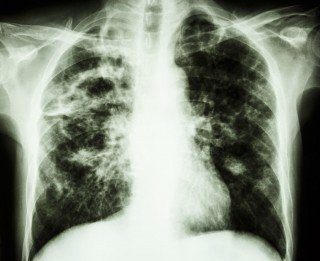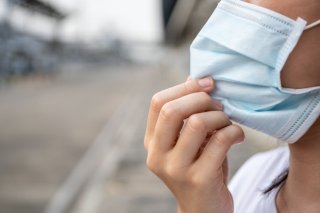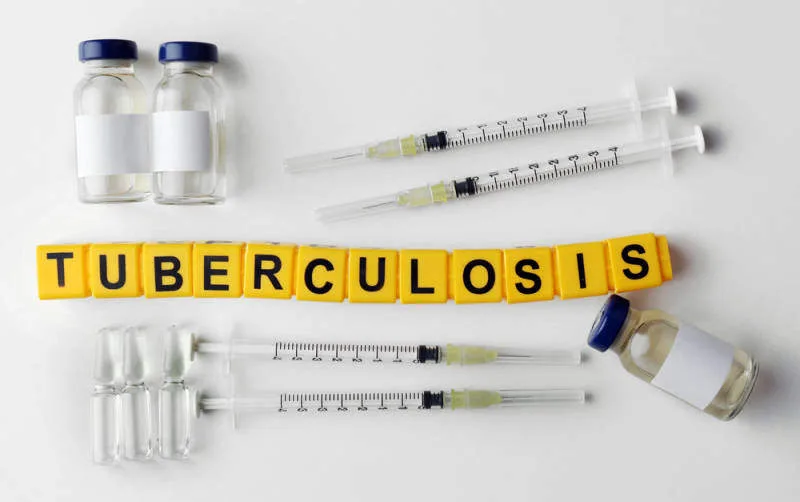On the 24th of March in 1882, Dr. Robert Koch announced that he had discovered the bacterium that causes TB. This discovery opened the way towards diagnosing as well as curing the disease. Almost 140 years later, TB still remains one of the deadliest infectious diseases out there.
This year, the theme for World TB Day 2021 is “The Clock is Ticking”. How so? The world is running out of time to act on the commitments to end TB made by global leaders.
That said, it’s important to act now and do our part when it comes to ending TB. However, to fix the issues, it’s important to first properly understand just exactly what the disease is.
What is TB?
“TB is a shortened abbreviation for Tuberculosis, and it is an airborne infection spread via respiratory droplets,” explains Dr. Yashica Khalawan, MBCHB., FPD., a general practitioner, who adds that the disease is usually caused by Mycobacterium tuberculosis bacteria.

Puwadol Jaturawutthichai/Shutterstock
“The most common form is pulmonary tuberculosis, which affects the lungs. However, TB can affect any part of the body, including the brain, spine, and skin,” adds Dr. Khalawan. A third of the world’s population is infected with tuberculosis. 10% of these individuals will go on to develop active tuberculosis.
What are the risk factors?
According to Dr. Khalawan, the key populations for TB are:
- People living with HIV
- Household contacts of TB patients
- Healthcare workers
- Inmates
- Pregnant women
- Children < 5 years old
- Mine workers and people in the peri-mining communities
Common symptoms
- A persistent cough (which lasts for more than 2 – 3 weeks)
- Coughing with blood in sputum
- Fever for more than 2 -3 weeks
- Sudden weight loss
- Night sweats
- Loss of appetite
It’s important to look out for these symptoms as undiagnosed active TB can lead to further tissue damage and death.
Can TB actually kill me?

Photo by cottonbro from Pexels
TB is the tenth leading cause of death worldwide.
“An estimated 360,000 South Africans became ill with tuberculosis in 2019, and an estimated 58,000 people died from TB.,” says Dr. Khalawan.
“The very high number of people with HIV in South Africa is increasing the number of people with active tuberculosis disease. Of the 58,000 people estimated to have died, an estimated 36,000 were HIV positive. TB continues to be the single largest contributor to death in South Africa.”
How does TB lead to death?
“The slowly progressive inflammation of tuberculosis destroys the tissues and leaves in their place a thick cheesy substance. “ explains Dr. Khalawan, “The final cause of death may be either multiple organ failure, internal hemorrhage in the lungs, or respiratory failure.”
How do I get tested for TB?
- Tuberculin skin test: Tuberculin – a TB antigen is injected to determine the extent of the immune response.
- Sputum culture test: Sputum is cultured for the presence of bacteria with a special stain.
- Pleural fluid analysis: Pleural fluid analysis is a group of tests used to diagnose the cause of TB.
- CT scan: CT scan of chest helps confirm pulmonary TB.
What happens if I have TB?
If you have been diagnosed with tuberculosis, you’re likely to be prescribed rifampicin, isoniazid, pyrazinamide, or ethambutol. These four medications will help manage the condition.
Is medication the only solution?
In addition to taking your prescribed medication, Dr.Khalawan finds that maintaining a healthy diet with lots of fresh fruit and vegetables can also help manage your condition. It’s also best to get enough sleep and avoid smoking and alcohol usage. You can also adopt healthy habits that will help enhance your immune system.

Puwadol Jaturawutthichai/Shuttertsock
COVID and Tuberculosis: What’s The Link?
People ill with COVID-19 and tuberculosis show similar symptoms such as cough, fever, and difficulty breathing. Both diseases attack primarily the lungs and although both biological agents transmit mainly via close contact, the incubation period from exposure to the disease to tuberculosis is longer, often with a slow onset.
“The COVID-19 pandemic led to a global reduction of 25% in expected TB detection for 3 months. This was a realistic possibility given the levels of disruption in TB services being observed in multiple countries. Therefore, we could expect a 13% increase in TB deaths. This will bring us back to the levels of TB mortality that we had 5 years ago,” explains Dr. Khalawan.
“Between 2020 and 2025 an additional 1.4 million TB deaths could be registered as direct consequence of the COVID-19 pandemic.”
Can COVID cause TB complications or vice-versa?
“While experience on COVID-19 infection in TB patients remains limited, it is anticipated that people ill with both tuberculosis and COVID-19 may have poorer treatment outcomes, especially if TB treatment is interrupted. “ explains Dr. Khalawan.
That said, it’s best for TB patients to take precautions as advised to be protected from COVID-19 and continue their tuberculosis treatment as prescribed. Inversely, a recent study by the renowned medical journal Lancet has stated that a face mask is very useful in preventing the spread of tuberculosis.
TB – COVID-related complications in South Africa
Despite the high TB rates, preliminary studies have indicated that HIV and TB have a modest effect on COVID-19 mortality.
“2% of COVID-19 deaths are attributable to TB, compared to 52% of COVID-19 deaths attributable to diabetes in South Africa”
How can I protect myself?
 There are many factors that encompass the prevention of tuberculosis;
There are many factors that encompass the prevention of tuberculosis;
-
Stop the transmission
Identify people with active TB and commence drug treatment. With the proper treatment, someone with diseases will very quickly not be infectious. This will mean that they can no longer spread it to others.
-
Cough etiquette
-
Use of masks and respirators in high-risk environments.
-
BCG vaccine
“The BCG vaccine has been shown to provide children with excellent protection against the disseminated forms of TB.,” says Dr. Khalawan. However, she does add that protection against pulmonary TB in adults is variable.
-
Chemoprophylaxis
Isoniazid is one of the drugs used to prevent latent tuberculosis from progressing to active tuberculosis or tuberculosis disease. It is mainly used to protect individuals rather than to interrupt transmission between adults.
As we’ve said, the clock is ticking and the recent pandemic has definitely sped it up. It’s time to keep our promises and do our part to #EndTB.
References
Coetzee, A., Taljaard, J. J., Hugo, S. S., Conradie, M., et al. (2020). Diabetes mellitus and COVID-19: A review and management guidance for South Africa. South African medical journal = Suid-Afrikaanse tydskrif vir geneeskunde, 110(8), 761–766.
Driessche, K. V., Mahlobo, P. Z., Venter, R., Caldwell, J., Jet al. (2021). Face masks in the post-COVID-19 era: a silver lining for the damaged tuberculosis public health response?. The Lancet. Respiratory medicine, S2213-2600(21)00020-5. Advance online publication. https://doi.org/10.1016/S2213-2600(21)00020-5
Who is Dr. Khalawan?
Dr. Yashica Khalawan, MBCHB., FPD., has over 6 years of experience as a general practitioner.

Dr. Yashica Khalawan
Having worked in a non-surgical aesthetic practice for the past 3 years she is now completing her post-graduate diploma in dermatology through the University of Plymouth(UK) with an interest in moving back into the government sector with a keen interest in internal medicine and primary health care.
As a young mother, Dr. Khalawan enjoys networking with fellow women in medicine to learn from each other academically and socially in order to improve work-life balance.
Her special interests include:
- Preventive healthcare: To promote health and wellbeing in individuals and communities with a view to preventing disease, disability, and death
- Primary Health Care
- Internal medicine and diagnostics
- General Dermatology
- Networking, empowerment, and mentorship of women in medicine





![women [longevity live]](https://longevitylive.com/wp-content/uploads/2020/01/photo-of-women-walking-down-the-street-1116984-100x100.jpg)









